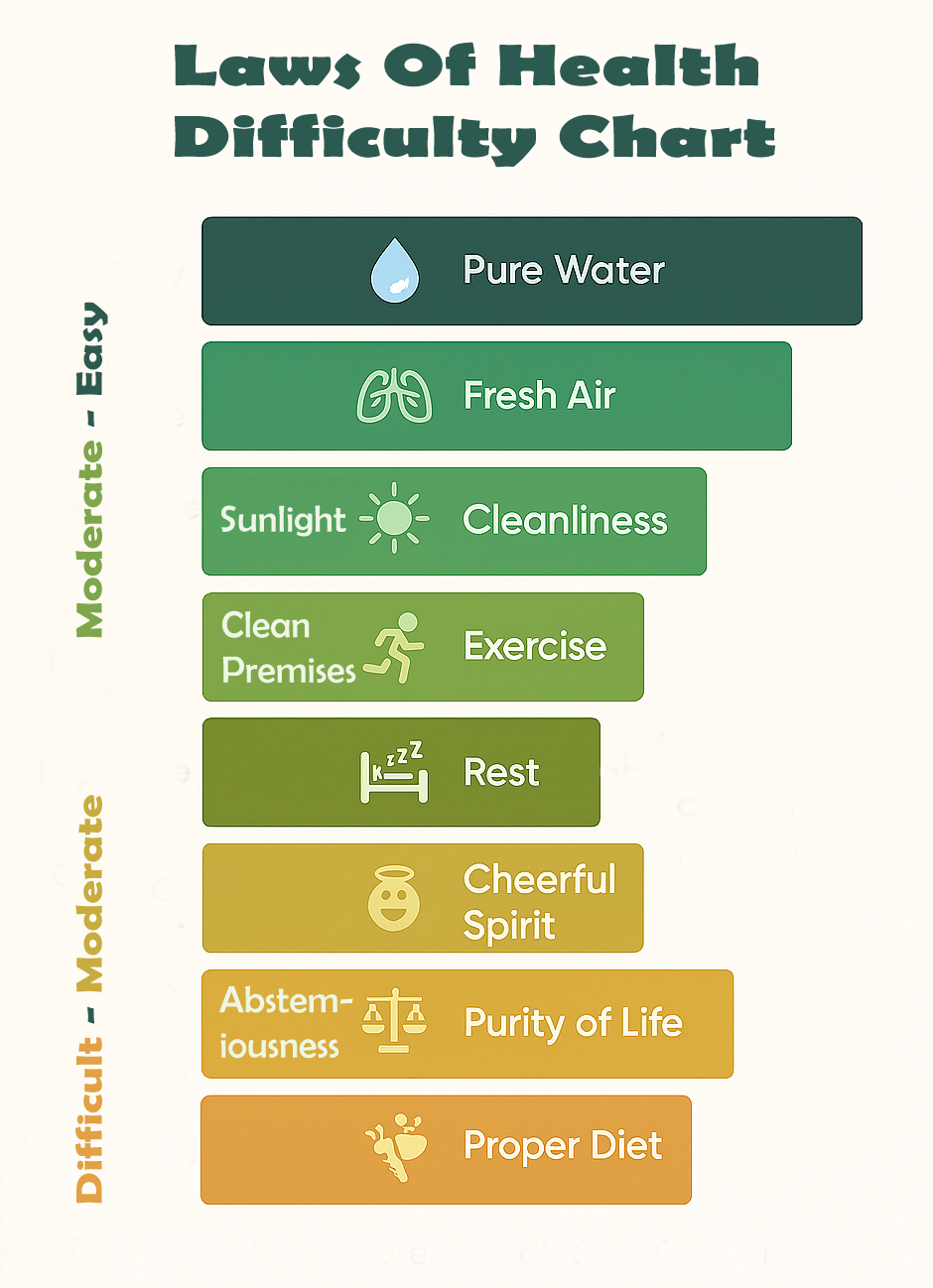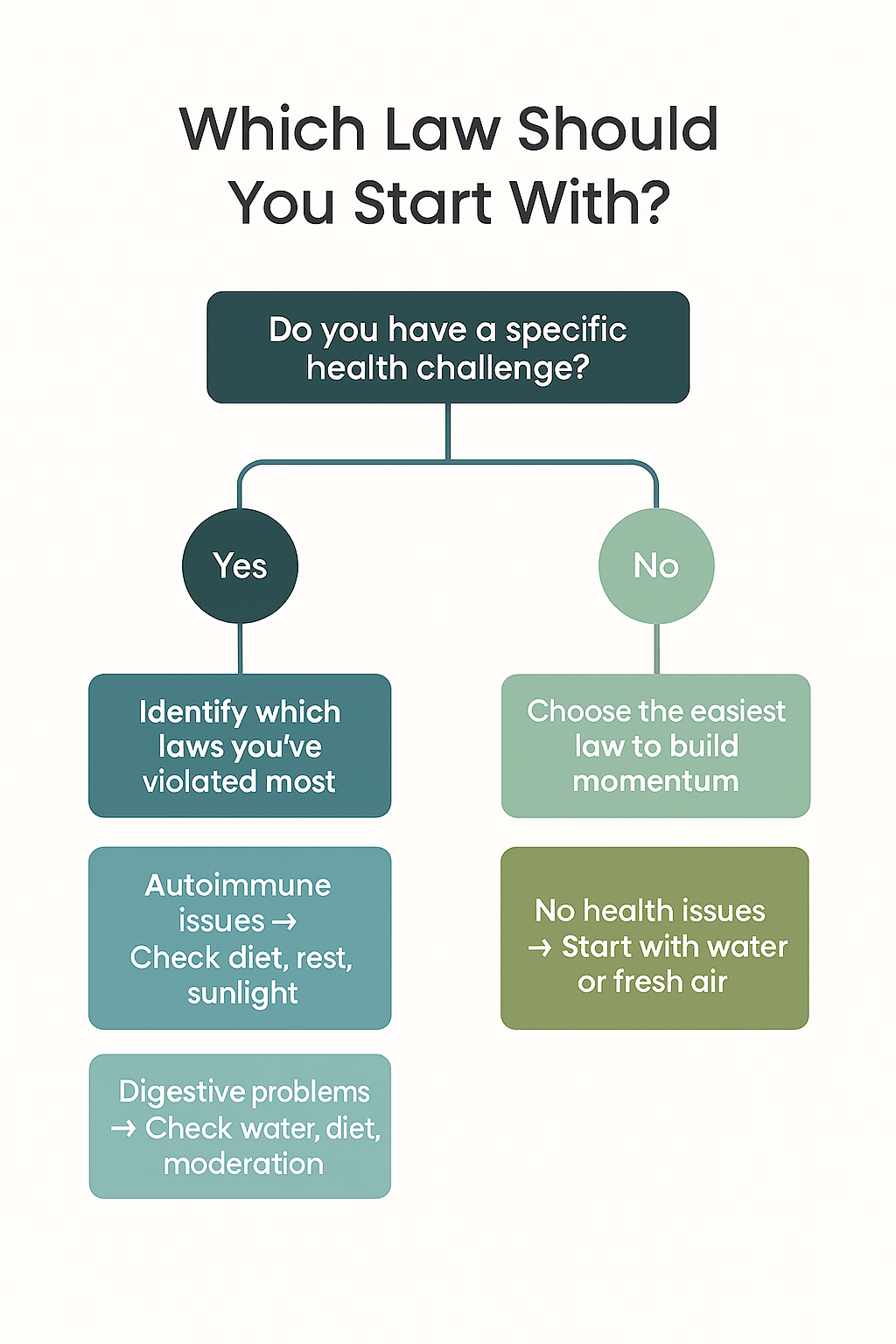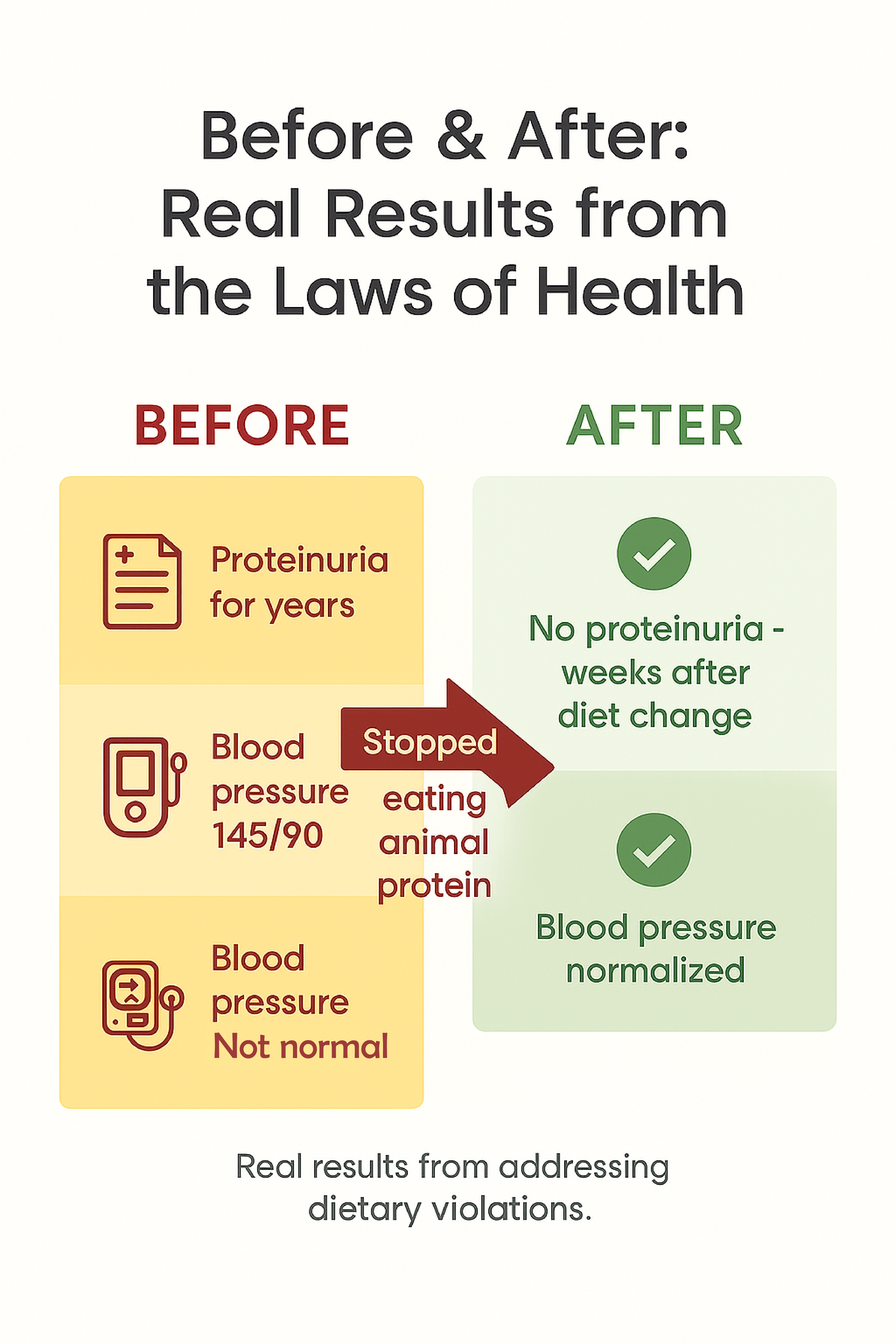The Natural Lifestyle: God's Blueprint for Vibrant Health.
Stop surviving and start thriving. Discover the 8 timeless principles from Eden that restored my health.
DISCOVER YOUR EDEN SCORE NOW (FREE 3-Min Assessment) →The Complete Guide to the Eight Laws of Health (Plus 10 & 12 Law Variations)
If you've been searching for a natural, holistic approach to health, you may have come across the phrase "the eight laws of health." These timeless principles have helped countless people like my wife and I restore balance and vitality without relying on quick fixes or fads.
But did you know that over time, two more laws were added, making them the 10 laws of health? And after years of personal study and experience, I believe there are actually 12 laws of health that complete the picture of what it means to live a vibrant, balanced life.

In this comprehensive guide, we'll explore:
- The original eight laws of health and what they mean
- How they evolved into the 10 and 12 laws of health
- How to choose your starting point based on your specific needs
- Real-life success stories and practical implementation tips
- Which framework (8, 10, or 12 laws) is right for you
By the end, you'll not only understand what each law means but also know exactly where to begin your own health transformation journey.
What Are the Eight Laws of Health?

The eight laws of health are simple, natural principles designed to help the body function at its best. They've been promoted for decades by wellness educators and continue to resonate because they focus on whole-person health, physical, mental, and spiritual.
Here's a detailed look at each law:
1. Fresh Air – Breathe Deeply, Live Fully

Fresh air is essential for oxygenating your body, strengthening your immune system, and clearing your mind. Spending time outdoors reduces stress and helps your body detox naturally.
💡 Quick Tip: Start your day with five minutes of deep breathing outside.
Implementation Level: Easy to Moderate (depends on air quality in your area)
2. Exercise – Move to Thrive

Movement keeps your heart, muscles, and bones strong. Exercise also improves mood, sharpens focus, and reduces anxiety. You don't have to join a gym, daily walking is one of the best forms of activity, especially if you're recovering from illness.
💡 Quick Tip: Aim for at least 30 minutes of movement a day. Even light walking counts.
Implementation Level: Moderate (may be challenging if very sedentary)
3. Pure Water – Hydrate for Life

Water is the body's most important nutrient. It supports digestion, circulation, and detoxification. Many people mistake thirst for hunger, leading to overeating and fatigue.
💡 Quick Tip: Drink a glass of water first thing in the morning and before each meal.
Implementation Level: Easy (simple addition to daily routine)
4. Proper Diet – Nourish to Flourish

Your body thrives on natural, whole foods. A diet rich in fruits, vegetables, grains, legumes, and nuts provides the vitamins and minerals needed for long-term health. Limiting processed foods, sugar, and unhealthy fats can prevent chronic disease.
💡 Quick Tip: Try filling half your plate with vegetables at lunch.
Implementation Level: Moderate to challenging (involves changing established habits and preferences)
5. Sunlight – Soak Up the Sun

Sunlight boosts Vitamin D production, strengthens bones, supports immune function, and lifts your mood. It also regulates your sleep cycle.
💡 Quick Tip: Aim for 20–30 minutes of sunlight daily, preferably in the morning.
Implementation Level: Easy to Moderate (can be challenging with work schedules)
6. Abstemiousness – Practice Moderation

Temperance means avoiding harmful substances like alcohol and drugs and practicing balance and moderation in good things like food, work, and even exercise. Too much of anything, even something healthy, can throw the body out of balance.
💡 Quick Tip: Ask yourself before indulging: "Is this helpful or harmful to my body?"
Implementation Level: Moderate to Challenging (depends on current habits)
7. Rest – Recharge Body and Mind

Sleep is the body's repair mode. During rest, your body heals, your brain processes information, and your immune system strengthens. Chronic sleep loss increases the risk of heart disease, obesity, and depression.
💡 Quick Tip: Create a bedtime routine and aim for 7–9 hours of quality sleep.
Implementation Level: Moderate (may require lifestyle adjustments)
8. Firm Trust in God – Faith for Strength

Spiritual well-being provides peace, resilience, and a sense of purpose. Whether through prayer, meditation, or community, trusting in a higher power has profound health benefits.
💡 Quick Tip: Take a few minutes daily to pray, meditate, or journal with gratitude.
Implementation Level: Easy to Moderate (depends on personal beliefs and practices)
From Eight Laws of Health to Ten Laws of Health
Over time, many health educators expanded the original framework by adding two additional principles, creating the 10 laws of health:
9. Cleanliness – A Healthy Body, A Healthy Life

Personal hygiene prevents disease, while clean surroundings promote mental clarity and peace of mind. Simple practices like handwashing, bathing, and oral care protect against illness.
💡 Quick Tip: Start with one small habit, like washing your hands before every meal.
Implementation Level: Easy (basic hygiene practices)
10. A Cheerful Spirit – The Power of Positivity

Your mindset directly affects your physical health. Laughter and optimism boost immunity, reduce stress, and improve resilience. A cheerful heart truly is good medicine.
💡 Quick Tip: Begin or end your day by writing three things you're grateful for.
Implementation Level: Moderate (requires mindset shifts)
Why I Embrace the 12 Laws of Health
Through my own health journey, including helping people reverse lupus symptoms and other chronic conditions, I've come to believe there are actually 12 laws of health. The two additional ones are:
11. Clean Sweet Premises

A tidy home or workspace reduces stress and creates an environment for healing. Clutter and dirt can harbor bacteria and drain mental energy.
💡 Quick Tip: Spend 10 minutes each evening tidying one room or area before bed.
Implementation Level: Easy to Moderate (depends on current living situation)
12. Purity of Life

Living with integrity, honesty, and moral clarity contributes to mental and emotional well-being. A pure life builds trust, strengthens relationships, and fosters inner peace.
💡 Quick Tip: Before making decisions, ask yourself: "Does this align with my values and who I want to be?"
Implementation Level: Moderate (ongoing personal development)
These final two may not appear in most lists online, but I believe they complete the picture of what it means to live a balanced, holistic lifestyle.
Finding Your Starting Point: Which Law Should You Begin With?

The key to success isn't trying to master all laws at once, it's finding the right starting point for your unique situation.
Start Based on Your Current Health Challenges
If you're dealing with a specific health issue, the most effective starting point is to examine all the laws and identify which ones you've violated the most. This is where you'll often see the quickest improvements.
Here's how to approach this:
Step 1: Review each law honestly
- Which laws am I currently neglecting?
- Where have I developed habits that work against these principles?
- Which violations might be contributing to my current health problems?
Step 2: Address the violations directly related to your condition
For autoimmune conditions (like lupus): Look at what's contributing to chronic inflammation. This might be:
- Poor diet (processed foods, sugar, inflammatory foods)
- Lack of rest (inflammation increases without proper sleep)
- Chronic stress (absence of cheerful spirit)
- Insufficient sunlight/vitamin D
- The key is stopping what's harming you, not just adding something beneficial

For vision problems or concentration issues: A friend who developed blindness discovered she had been severely violating the law of rest through chronic sleep deprivation. Once she addressed this violation, she saw remarkable improvement.
For digestive issues: Common violations include:
- Insufficient water intake
- Poor diet choices
- Eating without moderation such as between meals or too much at a meal (abstemiousness)
- High stress levels
- Poor quality of healthy foods
For chronic fatigue or mood concerns: Examine whether you're getting:
- Adequate fresh air and oxygen
- Regular movement/exercise
- Proper rest
- Sunlight exposure
The body often shows symptoms where we've created the biggest imbalances. By addressing those specific violations first, you give your body what it's been desperately missing, which can lead to faster, more noticeable improvements.
Start Based on Your Lifestyle
For busy office workers: Begin with pure water (easy to implement) or work on getting sunlight during lunch breaks.
For people with demanding schedules: Start with cleanliness or cheerful spirit practices that can be integrated into existing routines.
For those new to healthy living: Begin with pure water or fresh air—both provide quick wins that build motivation.
Overcoming Common Barriers
"I can't get sunlight because of my work schedule"
- Take outdoor lunch breaks, even if brief
- Use light therapy devices in winter
- Prioritize weekend morning sunlight exposure
- Consider vitamin D supplements with professional guidance
"I don't have time for exercise"
- Start with 5-minute walks during breaks
- Take stairs instead of elevators
- Do stretching exercises at your desk
- Remember: any movement counts
"Changing my diet feels overwhelming"
- Start with one healthy meal per day
- Focus on adding healthy foods before removing unhealthy ones
- Prepare simple, wholesome foods
- Make gradual swaps (brown rice for white rice, etc.)
8 vs 10 vs 12 Laws: Which Framework Is Right for You?
My Recommendation: Start with understanding all 8-12 laws, then focus on implementing 1-2 that address your most pressing needs or are easiest for your current lifestyle.
Real-Life Success Stories: The Power of Addressing Your Violations

My Wife's Lupus Journey - Protein in Urine Completely Resolved:
For years, every medical test my wife took showed protein in her urine (proteinuria), a common and concerning symptom of lupus that affects kidney function. We tried various approaches, but the protein persisted test after test.
Then we found research showing that excess animal protein could contribute to proteinuria. We made the decision to stop eating all animal foods, focusing instead on plant-based whole foods as part of the "Proper Diet" law.
The results were remarkable: just a few weeks after eliminating animal protein, her test came back with a reduced amount of proteinuria. Years later, the protein in her urine reduced gradually to negative and has never returned. This wasn't about adding something new, it was about identifying and removing what was violating the law of proper diet and harming her body.
My Own Blood Pressure Transformation:
High blood pressure and high cholesterol run in my family. My blood pressure consistently measured 145/90, firmly in the hypertension range. I initially changed my diet to support my wife's journey, not expecting it to dramatically affect my own health.
But when I stopped eating animal protein alongside her, my blood pressure returned to normal levels. No medication needed, just addressing a dietary violation I didn't even realize was affecting me so significantly.
What These Stories Teach Us:
Both of our experiences illustrate a crucial principle: sometimes the fastest path to healing isn't adding more healthy things, but stopping the violation that's causing the problem. We weren't deficient in something we needed to add, we were consuming something that was actively harming us.
When you identify which laws you've been violating most severely and address those violations directly, your body often responds quickly because you've removed the obstacle to its natural healing ability.
Common Mistakes When Starting the Laws of Health
- Trying to change everything at once - Pick 1-2 laws maximum to start
- Setting unrealistic expectations - Small, consistent changes trump dramatic overhauls
- Ignoring personal barriers - Address your specific challenges (schedule, budget, living situation)
- Giving up after setbacks - Progress isn't always linear; get back on track quickly
- Not tracking progress - Keep simple notes on how you feel and what's working
Budget-Friendly Ways to Practice the Laws of Health
- Fresh air: Free walks in parks or neighborhoods
- Exercise: Bodyweight exercises, walking, running
- Water: Invest in a good filter instead of buying bottled water
- Sunlight: Free from nature, just need to prioritize time outside
- Diet: Buy seasonal produce, cook at home, grow herbs
- Rest: Establish routines that don't cost money
- Cleanliness: Basic soap and water, declutter what you own
- Clean premises: Organize and clean what you have before buying new
Natural Health Principles for Busy Professionals
Working long hours doesn't mean you can't practice the laws of health:
Morning routine (5 minutes):
- Practice the art of gratitude first thing in the morning
- Drink a glass of water upon waking
- Step outside for deep breathing
- Set a positive intention for the day
During work:
- Keep a water bottle at your desk
- Take the stairs or walk to meetings when possible
- Practice good posture and take stretch breaks
Evening routine (10 minutes):
- Tidy your living space
- Practice gratitude or prayer
- Prepare for quality sleep
Frequently Asked Questions
Which law of health is easiest to start with?
Pure water is typically the easiest among the eight laws of health because it's a simple addition to your routine rather than changing existing habits. Fresh air is also easy if you have access to clean outdoor spaces.
Can you practice the 8 laws of health with a busy work schedule?
Absolutely! Start with small changes that fit your schedule, like drinking more water, taking walking breaks, and creating simple evening routines for better rest.
How long does it take to see results from the laws of health?
Some changes (like increased energy from better hydration) can be noticed within days. Others (like improved fitness or dietary changes) may take weeks or months. The key is consistency.
Do I need to follow all laws perfectly to see benefits?
Not at all. Even implementing 2-3 laws consistently can create significant improvements in how you feel and function.
What's the difference between the 8, 10, and 12 laws of health?
The original 8 focus on fundamental physical and spiritual health. The 10 laws add cleanliness and mental attitude. The 12 laws include environmental and moral components for complete holistic health.
Are the laws of health scientifically proven?
While the specific "laws" framework comes from biblical and traditional wellness education, each principle is supported by modern research on nutrition, exercise physiology, sleep science, and psychology.
Can children follow the laws of health?
Absolutely! Many of these principles are excellent for building healthy habits in children, adapted appropriately for their age and development level. In fact, our son has been following these laws from birth and just turned two years old. Starting children early helps them develop natural, healthy patterns that become second nature as they grow.
How do I stay motivated when progress feels slow?
Focus on how you feel rather than just physical changes. Keep a simple journal noting energy levels, mood, and sleep quality. Celebrate small wins and remember that health is a lifelong journey.
Your Health Transformation Starts Today
The Eight laws of health remain a timeless foundation for well-being. Whether you choose to follow the traditional 8, expand to 10, or embrace all 12 laws, the key is starting where you are and taking consistent small steps.
Remember:
- Start with one law that addresses your biggest need or feels most doable
- Build consistency before adding more laws
- Be patient with yourself - lasting change takes time
- Focus on progress, not perfection
Health isn't about following a rigid set of rules, it's about creating a lifestyle that supports your body's natural ability to thrive. These laws provide a framework, but your personal journey will be unique.
Which one of the eight laws of health will you start practicing today? Begin with something small, stay consistent, and trust the process. Your future self will thank you for taking that first step.
Ready to dive deeper? Explore each health law and our step-by-step implementation guides and seasonal health tips to make these laws work for your specific lifestyle and goals.